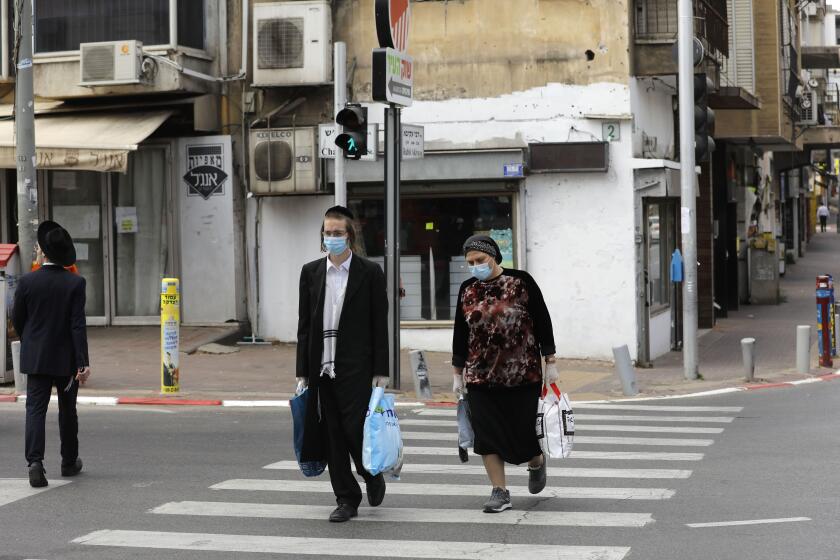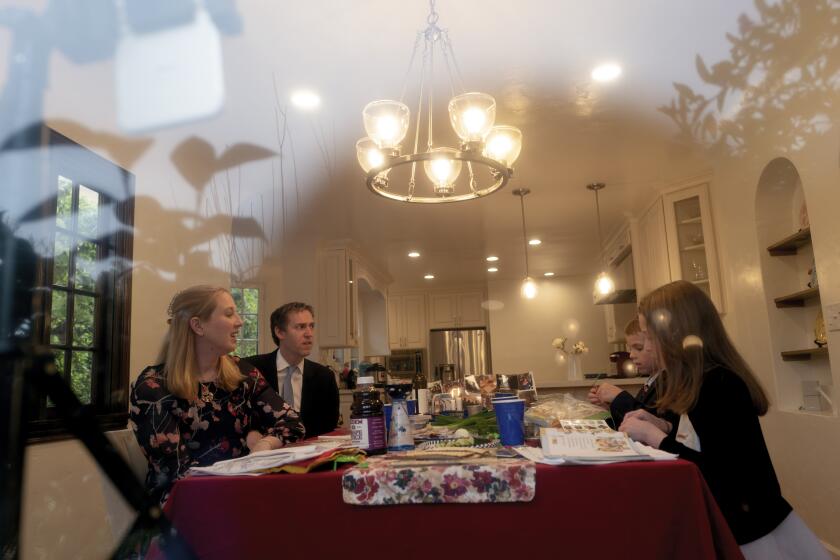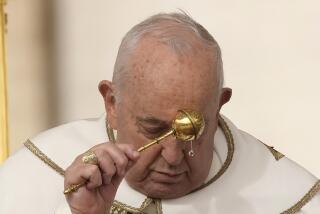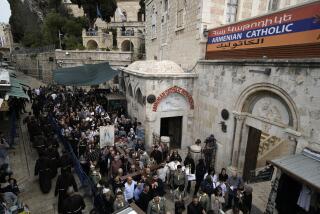Their faith tested, Christians mark Good Friday in isolation
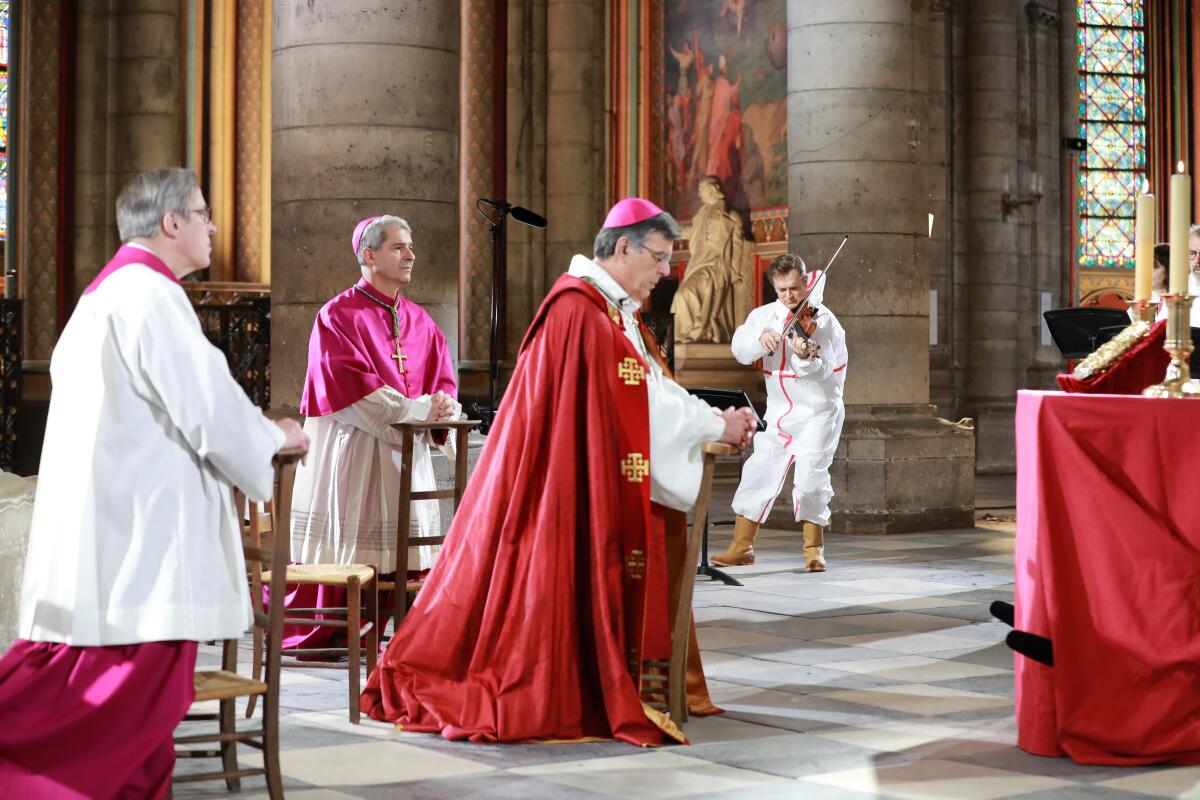
- Share via
JERUSALEM — On the day set aside to mark Christ’s crucifixion, most churches stood empty. Streets normally filled with emotional processions were silent. St. Peter’s Square was almost deserted. And many religious sites in the Holy Land were closed.
Instead, Christians around the world commemorated Good Friday behind closed doors, seeking solace in online services and trying to uphold centuries-old traditions in a world locked down by the coronavirus pandemic.
Inside Jerusalem’s Church of the Holy Sepulcher, the chanting of a small group of clerics echoed faintly through the heavy wooden doors, as a few people stopped and kneeled outside to pray. In St. Peter’s Square, Pope Francis presided over a candlelit procession, with nurses and doctors among those holding a torch.
The Jerusalem church, built on the site where Christians believe Jesus was crucified, buried and rose from the dead, is usually packed with pilgrims and tourists. But on Friday, four monks in brown robes and blue surgical masks prayed at the stations of the cross along the Via Dolorosa, the ancient route through the Old City where Jesus is believed to have carried the cross before his execution at the hands of the Romans. It runs past dozens of souvenir shops, cafes and hostels, nearly all of which are closed.
In any other year, tens of thousands of pilgrims from around the world retrace Jesus’ steps in the Holy Week leading up to Easter. But flights are grounded and most travel canceled as authorities try to prevent the spread of the virus.
Insular, traditional Jewish community, resistant to state authority, sees spike in COVID-19 cases in Israel.
James Joseph, a Christian pilgrim from Detroit dubbed “the Jesus guy” because he wears robes and walks about barefoot, lives near the Church of the Holy Sepulcher year-round. On Friday morning, he had the plaza to himself. He said Good Friday has special meaning this year.
“The crucifixion is the saddest thing possible, and he felt what we feel right now,” he said. “But thanks be to God. ... He rose from the dead and changed the world on Easter.”
In Rome, the torch-lit Way of the Cross procession at the Colosseum is a highlight of Holy Week, ordinarily drawing large crowds of pilgrims, tourists and locals. It’s been canceled this year, along with all other public gatherings in Italy, which is battling one of the world’s worst outbreaks.
In the United States, the Good Friday fast typically observed by Catholics was taken up by some in other denominations as a means to connect more deeply with their faith during difficult times.
“The savior himself declared that certain things go not out but by prayer and fasting,” said Russell Nelson, president of the Church of Jesus Christ of Latter-day Saints, as he called for a worldwide day of fasting and prayer to help bring relief from the pandemic.
Members of the Utah-based faith widely known as the Mormon church normally fast one day a month in a practice they believe prepares people to receive God’s blessings. They do it more often in times of crisis.
Archbishop Jose Gomez of Los Angeles, president of the U.S. Conference of Catholic Bishops, held a national prayer that was streamed online.
“God gave his own son for us, so we know that he will deliver us from this evil of the coronavirus,” Gomez said.
President Trump participated in a pre-Easter blessing at the White House alongside Maryland-based Pentecostal Bishop Harry Jackson, who prayed for “this plague to pass over.”
The new virus causes mild to moderate symptoms in most patients, and the vast majority recover. But it is highly contagious and can be spread by those who appear healthy. It can cause severe illness and death in some patients, particularly the elderly and infirm.
In Italy, where the virus has killed more than 18,000 people, the pope led a Good Friday ceremony where healthcare workers in white coats provided a stark reminder of how the virus outbreak has infused almost all walks of life.
During the evening service, which was closed to the public, Pope Francis listened to the papal preacher say the COVID-19 pandemic has aroused people’s awareness to the danger of thinking themselves all-powerful. The Rev. Raniero Cantalamessa said “it took merely the smallest and most formless element of nature, a virus, to remind us that we are mortal.”
The virus has killed more than 100,000 worldwide, according to data gathered by Johns Hopkins University.
In Paris, a ceremony closed to the public was held in the charred and gutted interior of Notre Dame Cathedral, which was nearly destroyed by fire a year ago.
Archbishop Michel Aupetit and three other clergymen wore hard hats as they entered the damaged cathedral before removing them for the ceremony. Standing before a large cross and beneath a gaping hole in the roof, they sang, prayed and venerated a crown of thorns that survived the flames.
The bishop said the ceremony, which was broadcast live, showed that “life is still here,” even as the pandemic is “spreading death and paralyzing us.”
As rabbinic authorities have instructed households to maintain social distancing, the Jewish community is helping those who will be observing Passover alone or without their families.
One American archbishop, Gregory Aymond of New Orleans, took to the skies in a gesture of devotion.
Aymond, who himself has recovered from the coronavirus, flew over the city in a World War II-era biplane and took with him holy water from the Jordan River where Christ was baptized to sprinkle over the city, and the Eucharist, to bless those afflicted by the virus as well as first responders.
In the Philippines, where churchgoers were told to stay home, Josille Sabsal treated the moment as a test of faith. The 30-year-old Catholic missionary tried to replicate an altar in her Manila home by setting up a laptop, a crucifix and small statues of Jesus and the Virgin Mary on a table.
“I miss that moment in church when you say, ‘Peace be with you,’ to complete strangers and they smile back,” she said.
More to Read
Sign up for Essential California
The most important California stories and recommendations in your inbox every morning.
You may occasionally receive promotional content from the Los Angeles Times.
